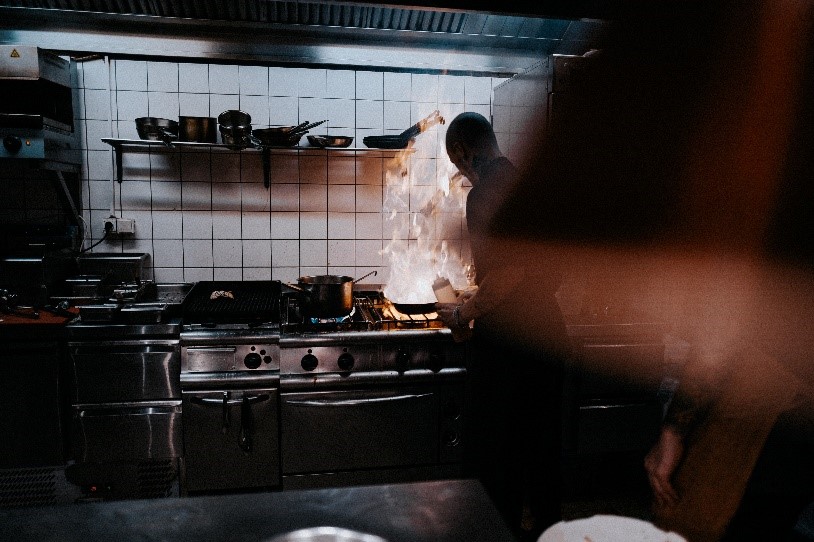
In The Lord of the Flies, William Golding tells a story about a group of boys stranded on a tropical island. It is not a story about collaboration, comradeship and survival in the face of adversity. Instead, Golding’s novel is about the boys’ decent into lawlessness and an increasingly wild existence. The Lord of the Flies is a commentary on the effect of being isolated from civilization and freed from constraining oversight. More than this, it is about the fragility of society, the easy with which civility can be suspended and overlaid by a different, darker, more violent social order.
From deserted islands to isolated kitchens
Published in Journal of Management Studies here, our articleis concerned with the connection implicit in Golding’s novel, between isolated places and divergent modalities of behaviour. We address the phenomenon of place-based misbehaviour.
We address this phenomenon in the context of a very specific group of workers: chefs employed in elite, fine dining restaurants around the world. What we reveal is an interlinked belief in two main things. First, that kitchens are isolated places where chefs feel hidden from mainstream society. Second,thatin isolated, hidden away places – such as kitchens – it is possible to misbehave with relative impunity.
We show that these beliefs were widely held amongst the 47 chefs’ we interviewed, who understood the kitchens they worked in to be figuratively different worlds. In the different world of the kitchen a different moral code applied. There was the belief that mainstream rules didn’t apply. Thus what we show is that in the kitchen misbehaviour is seen as possible, and even normal, because the kitchen is isolated.
Why thinking about misbehaviour as an effect of isolation is helpful
The significance of our findings is not actually the stark, brutal reality of the misbehaviour reported by the chefs who participated in our study. This is important, but it is actually already well known. From academic studies we knowthat hospitality is an industry where violent forms of misbehaviour are common. We also know that this violence is driven by militaristic cultures, hypermasculine values, extreme ideologies and the natural brutality of physical, stressful, fast-paced work.
Violence perpetrated by chefs in kitchens is also a common theme in the mass media. For example, on television obsessive, impassioned, abusive gastronomes continue to take centre stage and be celebrated. Paradoxically, we forgive their bullying, violent and aggressive behaviour. We don’t (generally) treat it as deviance. For many people, it’s not naughty. Rather, it is intriguing and entertaining. It is a symptom of laudable dedication. It is the unfortunate by-product of the otherwise admirable pursuit of excellence.
Against this backdrop the significance of our study is that it spotlights the effect of the kitchen environment and adds ‘isolation’ to the list of reasons why chefs’ misbehave. In fact, we add two things.
First, we show that misbehaviour can be understood as something that is known as ‘spatial effect’. That is, as a potentiality – a mode of behaviour – that is made possible by what we call a ‘geography of deviance’. Theorized in this way, misbehaviour in organizations – but specifically amongst chefs in kitchens – is understood as something subtly but literally inscribed into the physicality of a place. It is something coded – that is, built into – the geography of a particular (work)place.
So, in the case of chefs, misbehaviour is understood as a possibility created by kitchens’ [isolating] physical structures. By things like enclosed, windowless rooms located in basements and other sub-prime areas that are hidden away and shielded from view. These structures matter because they create feelings of invisibility, alienation and detachment – a sense of being away from and invisible to wider society. Our argument is that these feelings – these spatial effects– play an important role in facilitating and enabling cultures of misbehaviour to endure and proliferate.
The second way that our study advances understanding of misbehaviour in organizations is by invoking Victor Turner’s theory of communitas. Specifically, his concept of normative communitas. Doing this enables us to cast chefs’ misbehaviour as a fundamentally communitarian phenomenon. It enables us to see chefs’ misbehaviour as a ritualized component of an anti-structural way of being, where the kitchen is simultaneously apprehended as an instrument of social withdrawal and a symbol of detachment and deviance around which the community pivots. The potentialities of the kitchen is, we argue, made available to chefs via exclusionary structures that create both freedom from external scrutiny and the freedom to step outside of mainstream structural roles and obligations.

0 Comments